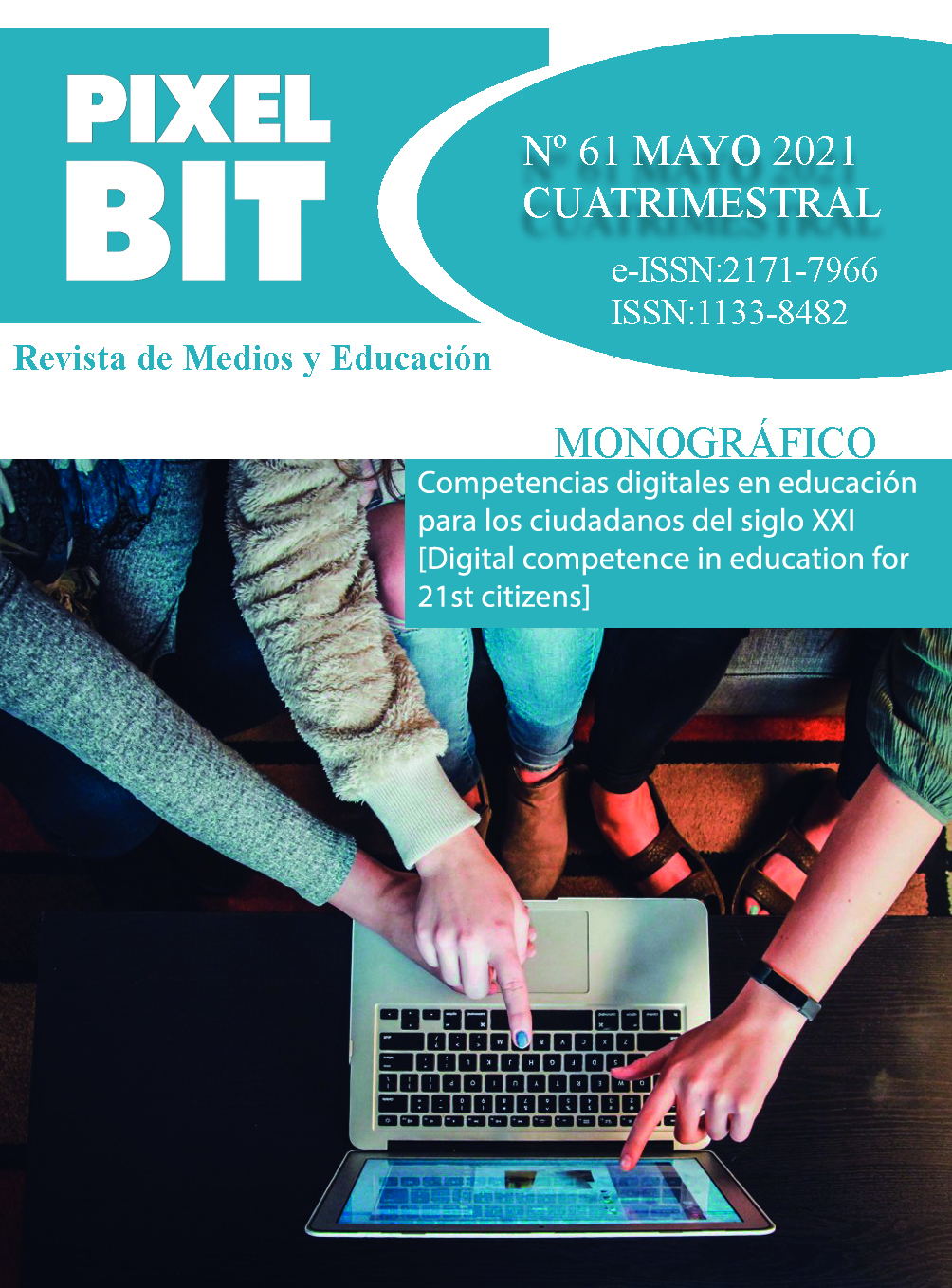Resumen
El presente trabajo pretende, por una parte, crear un instrumento para evaluar las habilidades digitales de alumnos de educación infantil (de 3 a 6 años de edad) partiendo de sus prácticas de aula; y por otra, valorar los niveles de autonomía adquiridos por los alumnos respecto de dichas habilidades. El estudio se realizó durante dos años escolares, recopilando datos de un total de 254 alumnos de 17 aulas con un recurso TIC en ocho escuelas. En primer lugar, los resultados ofrecen un instrumento diseñado y verificado en la práctica para la evaluación de las habilidades digitales. En segundo lugar, los resultados sobre autonomía destacan la importancia que tienen factores como la madurez, el contenido curricular y la naturaleza de la práctica en el aula para explicar la adquisición de habilidades digitales. Es importante subrayar la necesidad de realizar más estudios de evaluación de habilidades adoptando un enfoque centrado en las prácticas.
Citas
Burnett, C. (2009). Research into literacy and technology in primary classrooms: an exploration of understandings generated by recent studies. Journal of Research in Reading, 2(1), 22-37. https://doi.org/10.1111/j.1467-9817.2008.01379.x
Chauhan, S. (2017). A meta-analysis of the impact of technology on learning effectiveness of elementary students. Computers & Education, 105, 14-30. https://doi.org/10.1016/j.compedu.2016.11.005
Clements, D. H., Sarama, J., Wolfe, C. B., & Spitler, M. E. (2013). Longitudinal evaluation of a scale-up model for teaching mathematics with trajectories and technologies: Persistence of effects in the third year. American Educational Research Journal, 50(4), 812-827. https://doi.org/10.3102%2F0002831212469270
Comisión Europea (2016). Lifelong learning—Key competences: Summary of Recommendation 2006/962/EC on key competences for lifelong learning. European Commission. http://bit.ly/3saiCze
Donker, A., & Reitsma, P. (2007). Aiming and clicking in young children's use of the computer mouse. Computers in Human Behavior, 23(6), 2863-2874. https://doi.org/10.1016/j.chb.2006.06.002
Escudero, T. (2016). La investigación evaluativa en el Siglo XXI: Un instrumento para el desarrollo educativo y social cada vez más relevante. Relieve. Revista Electrónica de Investigación y Evaluación Educativa, 22(1), 1-21. https://doi.org/10.7203/relieve.22.1.8164
Flewitt, R. S. (2011). Bringing ethnography to a multimodal investigation of early literacy in a digital age. Qualitative Research, 11(3), 293-310. https://doi.org/10.1177/1468794111399838
Guitert, M., Romeu, T. & Baztán, P. (2021). The digital competence framework for primary and secondary schools in Europe. European Journal of Education, 56(1), 133-149. https://doi.org/10.1111/ejed.12430
Kirschner, P.A., & Kester, L. (2016). Towards a research agenda for Educational Technology Research. En N. Rushby & D. W. Surry (eds.). The Wiley Handbook of Learning Technology (pp. 523-541). John Wiley & Sons, Inc. https://doi.org/10.1002/9781118736494.ch27
Krcmar, M., & Cingel, D. P. (2014). Parent–child joint reading in traditional and electronic formats. Media Psychology, 17, 262–281. https://doi.org/10.1080/15213269.2013.840243
Kucirkova, N. (2018). Personalized learning with digital technologies at home and school: where is children’s agency?. En G. Oakley (Ed.), Mobile Technologies in Children’s Language and Literacy: Innovative Pedagogy in Preschool and Primary Education (pp. 133-153). Emerald Publishing. https://doi.org/10.1108/978-1-78714-879-620181009
Lau, C., Higgins, K., Gelfer, J., Hong, E., & Miller, S. (2005). The effects of teacher facilitation on the social interactions of young children during computer activities. Topics in Early Childhood Special Education, 25(4), 208-217. https://doi.org/10.1177/02711214050250040201
Law, N., Lee, Y. & Yuen, H.K. (2009). The impact of ICT in education policies on teacher practices and student outcomes in Hong Kong. En F. Scheuermann, & F. Pedro (Eds.). Assessing the effects of ICT in education – Indicators, criteria and benchmarks for international comparisons (pp. 143-164). Publications Office of the European Union. http://dx.doi.org/10.2788/27419
Levy, R. (2009). ‘You have to understand words...but not read them’: young children becoming readers in a digital age. Journal of Research in Reading, 32(1), 75-91. https://doi.org/10.1111/j.1467-9817.2008.01382.x
Lin, C.H. (2012). Application of a Model for the Integration of Technology in Kindergarten: An Empirical Investigation in Taiwan. Early Childhood Education Journal, 40(1), 5–17. https://doi.org/10.1007/s10643-011-0494-5
LOE. Ley Orgánica 2/2006, de 3 de mayo, de Educación (2006). Boletín Oficial del Estado, 106, 4 de mayo de 2006, 17158-17207. España. https://www.boe.es/eli/es/lo/2006/05/03/2
Martín, E., & Luna, M. (2011). El asesoramiento a la elaboración, seguimiento y mejora de proyectos curriculares de centro basados en competencias. En E. Martín & J. Onrubia. (coords.) Orientación educativa y procesos de innovación y mejora de la enseñanza en la educación secundaria (pp. 54-75) Colección Educación Secundaria. N.15. Vol.III. Graó.
Neumann, M.M., Finger, G. & Neumann, D. L. (2017). A Conceptual Framework for Emergent Digital Literacy. Early Childhood Education Journal, 45(4), 471–479. https://doi.org/10.1007/s10643-016-0792-z
Pérez-Sanagustín, M., Nussbaum, M., Hilliger, I., Alario-Hoyos, C., Heller, R. S., Twining, P. & Tsai, Ch. (2017). Research on ICT in K-12 schools. A review of experimental and survey-based studies in computers & education 2011 to 2015. Computers & Education, 104, A1-A15. https://doi.org/10.1016/j.compedu.2016.09.006
Phuoc Tran, & Subrahmanyam, K. (2013). Evidence-based guidelines for the informal use of computers by children to promote the development of academic, cognitive and social skills. Ergonomics, 56(9), 1349-1362. https://doi.org/10.1080/00140139.2013.820843
Siraj-Blatchford, J. & Siraj-Blatchford. I. (2004). IBM KidSmart Early Learning programme European Evaluation. European Commission for Education and Culture and IBM. https://bit.ly/3cPBhda
Stevenson, I. (2013). Does technology have an impact on learning? A Fuzzy Set Analysis of historical data on the role of digital repertoires in shaping the outcomes of classroom pedagogy. Computers & Education, 69, 148–158. https://doi.org/10.1016/j.compedu.2013.07.010
Voogt, J., Knezek, G., Christensen, R., Lai, K.-W. (Eds.) (2018). Second Handbook of Information Technology in Primary and Secondary Education. Springer International Publishing AG. https://doi.org/10.1007/978-3-319-71054-9
Willoughby, D., Evans, M. A., & Nowak, S. (2015). Do ABC eBooks boost engagement and learning in prescholers? An experimental study comparing eBooks with paper ABC and storybook controls. Computers & Education, 82, 107-117. https://doi.org/10.1016/j.compedu.2014.11.008

Esta obra está bajo una licencia internacional Creative Commons Atribución-NoComercial-SinDerivadas 4.0.
Derechos de autor 2021 Píxel-Bit. Revista de Medios y Educación

